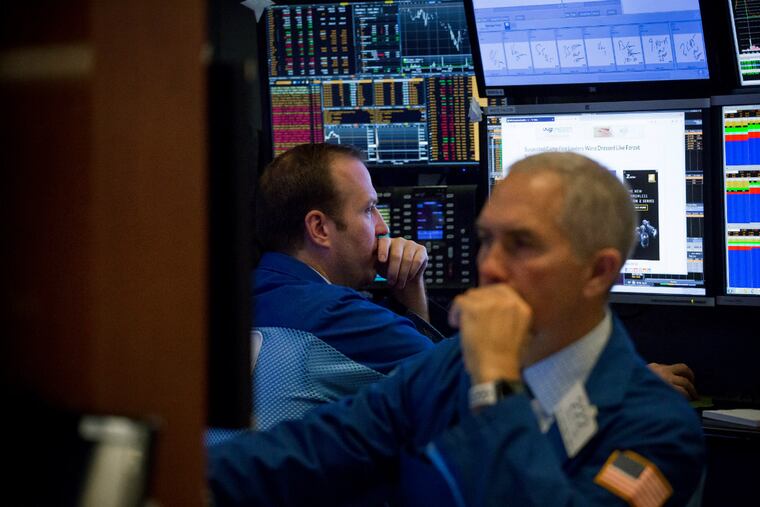US stocks skid again on renewed fears that tech sector has run out of steam
The Nasdaq, which has been in a pressure cooker for weeks, falls another 2.8 percent, dragging down the broader market.

U.S. markets dropped Monday on renewed fears that the tech sector has run out of steam.
The Dow Jones industrial average dropped 601 points, or 2.3 percent, to 25,387.18, in the session.
The blue-chip barometer was dragged lower by the tech-heavy Nasdaq composite index, which tanked 2.8 percent on the weak technology shares. More than 70 percent of the tech sector is in correction territory – meaning the share prices are more than 10 percent off their peak.
The Standard & Poor's 500-stock index was off 2 percent. Of its eleven sectors, real state was the only one that ended trading in the black Monday.
The Nasdaq has been in a pressure cooker for weeks as technology, particularly the so-called FAANG companies – Facebook, Amazon, Apple, Netflix and Google-parent Alphabet – have hit turbulence with investors.
"It's mostly Apple," said Ed Yardeni, president of Yardeni Research. "More selling of the FAANG stocks. The stocks that can do no wrong now are tripping up. They were leading the market higher and the market narrowed over the past year as the big-cap tech names led the way up. And now a lot of the air is coming out of them."
Apple shares slid Monday after a key supplier disclosed that one of its largest customers had reduced its request for shipments. Analysts identified the customer as Apple.
Luke Tilley, chief economist at Wilmington Trust Investment Advisors, attributed the slide in technology shares to the outsize gains the sector had this year.
"It stood the most to lose when we have one of these textbook, market corrections," Tilley said.
"Today's discussion about a slowdown in technology pipelines seems to be top of mind" among investors, said Wayne Wicker, chief investment officer at Vantagepoint Investment Advisers. "A slowdown in future order rates could call into question if we are peaking in economic growth, which certainly does not bode well for corporate earnings."
Europe also posted across-the-board drops, with the German Dax down nearly 2 percent.
Apple was down 4.8 percent after posting a strong quarter. But analysts are worried that sales of the vaunted iPhone and Mac are slowing. Online retail giant Amazon.com, led by Washington Post owner Jeffr Bezos, was down 4.4 percent and ended the day in bear market territory. Netflix was off 3.1 percent, Alphabet was down 2.6 percent, and Facebook fell 2.4 percent.
The biggest drag on the Dow was Goldman Sachs, which was down nearly 8 percent. A Bloomberg report Monday said Malaysia is seeking up to $600 million in refunds for the fees it paid the U.S. investment bank for three bond deals that are at the center of an embezzlement and money laundering scandal. Microsoft, Boeing, Intel and Cisco were also in decline
The market was also hampered by a strong dollar, which is attributable in part to solid economic growth and rising interest rates in the United States. A strong dollar can make U.S. products more expensive overseas, hurting sales and profits.
Oil prices climbed Monday morning on news that OPEC may cut daily oil production to align supply and demand and help boost prices. By late afternoon, they'd tipped lower again, extending losses that have stretched over recent weeks.
Benchmark Brent Crude was selling for $69.30 per barrel, down 1.9 percent from Friday. U.S. West Texas Intermediate oil was down 1.3 percent, at $59.03.
The oil market has been flooded with resurgent production by the United States, where fracking innovations have more than doubled production and made the country a fossil fuel exporter.
Saudi Arabia, which is the de facto leader of OPEC and a key oil producer at more than 10 million barrels per day, is the key to getting oil prices higher.
Saudi Arabia wants to keep a robust oil price in the $80 to $90 per barrel range.
President Donald Trump renewed his pressure on Saudi Arabia and OPEC to keep supplies flowing and the price of oil at reasonable levels: "Hopefully, Saudi Arabia and OPEC will not be cutting oil production. Oil prices should be much lower based on supply!"
"Saudi is between a rock and a hard place," said Tamar Essner, energy director at Nasdaq IR Intelligence. "They are going to do everything they can to talk prices up. But unless there is a significant downturn in price, I don't think they can cut back on supply."
"We expect the economy to support an expanding equity market," Tilley said. "But there are clear risks around the trade and tariff situation."
He is also concerned about Washington politics following the Democratic takeover of the House last week.
"The split control usually bodes well for markets," Tilley said. "But depending on brinksmanship between the two parties, the split has the ability to cause major problems around the government, especially around the debt ceiling and the funding of the government."